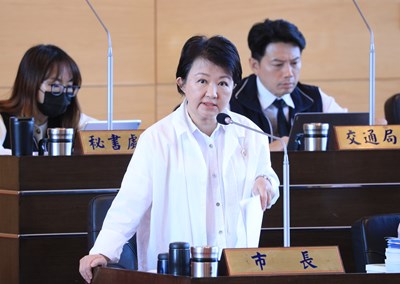
Today (9th), the Taichung City Council held a general interpellation session, where multiple council members raised questions about Mayor Lu Hsiu-yen’s recent keynote speech at the European Chamber of Commerce Taiwan (ECCT) luncheon, during which she addressed European businesses' concerns regarding renewable energy and wind power in Taiwan. She noted that her speech, titled “The Appeal of Taichung,” highlighted the city’s economic status, cultural festivities, and local cuisine. When asked about Taiwan’s planning on wind power share, she explained that this matter falls under the jurisdiction of the central government, making it inappropriate for her to respond on its behalf. However, Mayor Lu assured that Taichung’s Economic Development Bureau has set up a one-stop point of contact to streamline administrative procedures. She encouraged foreign investors to actively consider Taichung as an investment destination.
Regarding criticisms by some council members that Mayor Lu should know about the proportion of the future national wind power, Council Member Liu Shih-Chou pointed out during the interpellation session that energy policy falls under the jurisdiction of the central government. Since the central government has not yet detailed plans for increasing the proportion of renewable energy like wind power, it is natural for local leaders to lack such information. Criticizing local leaders for not responding to questions about an issue that even the central government might not fully grasp is, according to Liu, unfairly one-sided.
On this matter, Mayor Lu clarified that her speech at the ECCT, titled “The Appeal of Taichung,” was not dedicated to wind power development. Given the diverse industries represented by ECCT members, she used the occasion to showcase Taichung’s strengths, including its recent economic progress and events like the Taichung Shopping Festival. She expressed her heartfelt thanks to European diplomats for supporting the festival’s promotion and emphasized Taichung’s diverse and rich culinary scene as one of the city’s key appeals.
Mayor Lu elaborated that during the Q&A session at the luncheon, an ECCT member expressed concern about Taiwan’s underwhelming progress in green energy development, noting that the central government aims for a 20% renewable energy share but has yet to reach even 10%. The member asked for her perspective on the future share of wind power in the power mix. However, as energy planning falls under the jurisdiction of the central government, she could not answer a question that only the central government can address. She hoped council members would understand.
Regarding subsidies for wind power developers, the Economic Development Bureau added that in August 2020, Taichung secured an investment of NT$602 million from Enercon Taiwan, the Taiwan branch of Germany’s largest wind turbine manufacturer, which relocated its APAC regional hub to Taichung. Between 2020 and 2024, the city provided NT$3.8 million in subsidies, covering items such as rent, worker vocational training, and employee wages. These subsidies helped Enercon to set up an Asia training center, a procurement center, and a maintenance center in Taichung, making Taichung a pivotal base for wind energy talent development. Engineers trained here have installed over 220 wind turbines, representing 70% of Taiwan’s total wind power capacity.
Additionally, regarding challenges businesses encounter during investments, such as environmental impact assessments, urban design reviews, building permit applications, and factory expansions, the Economic Development Bureau has established a one-stop point of contact as a mechanism to remove investment obstacles, preventing delays in business investment timelines caused by the involvement of multiple agencies. By coordinating with various agencies through its investment promotion task force, the Bureau provides comprehensive and clear solutions, helping to maintain investor confidence and expedite the completion of projects.
For instance, in the expansion of Siemens Gamesa’s offshore wind turbine nacelle facility, the city government confirmed that no environmental impact assessment was needed and expedited processes such as urban design reviews and building permit and use permit acquisition. Assistance was also provided in resolving ambiguities related to urban design reviews for the nacelle storage area, allowing the expansion to finish ahead of schedule and greatly enhancing production capacity.
According to the Economic Development Bureau, Taichung’s Offshore Wind Power Block Development Phases 3-1 and 3-2 have been allocated 500 MW and 600 MW of capacity, respectively, with development led by Fengmiao Offshore Wind Power Company under Copenhagen Infrastructure Partners (CIP). The city government has held numerous meetings to coordinate issues such as the impact of offshore wind installations on marine areas, fisheries compensation, land acquisition for onshore substations, and pipeline excavation. These projects are expected to connect to the grid and generate power in 2027 and 2029, supporting Taiwan’s efforts toward energy diversification.
The Economic Development Bureau stressed that the city government will continue to align with the central government’s energy transition policies and work actively to promote renewable energy. As of October 2024, according to Taipower’s data, Taichung had a total renewable energy capacity of 2,066 MW (covering solar, hydropower, and wind power), ranking fourth nationwide and second among the six municipalities. Moving forward, Taichung will continue to focus on promoting renewable energy sources, such as rooftop solar panels, small hydropower, and offshore wind power, to help attract business investments.

 Facebook
Facebook
 Twitter
Twitter
 LINE
LINE